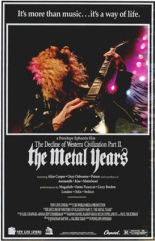
 Back in 1981, filmmaker Penelope Spheeris released a searing, exciting and sometimes frightening documentary about L.A’s then-burgeoning punk-rock movement. The Decline of Western Civilization told the tales of the bands responsible for that music’s rise to infamy, most memorably including a pre-Henry Rollins Black Flag and The Germs.
Back in 1981, filmmaker Penelope Spheeris released a searing, exciting and sometimes frightening documentary about L.A’s then-burgeoning punk-rock movement. The Decline of Western Civilization told the tales of the bands responsible for that music’s rise to infamy, most memorably including a pre-Henry Rollins Black Flag and The Germs.
Seven years later, a new kind of music dominated L.A’s scene, inspiring Spheeris to once again pick up her camera, but what she found resulted in a completely different kind of film. If the first Decline was a dramatic look at a movement filled with disaffected youth producing the sonic equivalent of their own dissatisfaction and inner torment, Part II: The Metal Years turned out to be a comedy about a bunch of shiftless douchebags who liked to wear makeup and get laid.
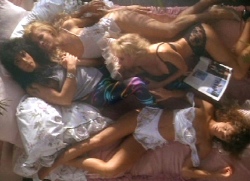 Its subtitle is somewhat misleading, since the bulk of the acts under view here are of the glam variety, leaving just Megadeth for those who take their metal seriously. A few legends pop in and out during the interviews (including Ozzy Osbourne, Alice Cooper, Steven Tyler, Joe Perry, Lemmy, Paul Stanley and Gene Simmons), but for the most part, we’re left with clueless wannabes (like the members of Odin, who insist they’ll only be satisfied until they’re as big as Led Zeppelin or The Beatles. I wonder how that worked out for them?), along with a few almost-weres (London, Faster Pussycat) and Poison (who almost inexplicably come of as sweet, self-aware dudes).
Its subtitle is somewhat misleading, since the bulk of the acts under view here are of the glam variety, leaving just Megadeth for those who take their metal seriously. A few legends pop in and out during the interviews (including Ozzy Osbourne, Alice Cooper, Steven Tyler, Joe Perry, Lemmy, Paul Stanley and Gene Simmons), but for the most part, we’re left with clueless wannabes (like the members of Odin, who insist they’ll only be satisfied until they’re as big as Led Zeppelin or The Beatles. I wonder how that worked out for them?), along with a few almost-weres (London, Faster Pussycat) and Poison (who almost inexplicably come of as sweet, self-aware dudes).
At some point, Spheeris clearly grasped the absurdity of the culture she was documenting and went with it. She films her interview with Stanley with him in bed with three centerfolds, while Simmons’ is conducted in a lingerie shop filled with browsing Playmates. She interviews Ozzy while he makes breakfast (!) and even if he comes off far more coherent and cogent than you’d expect, she still gets away with inserting a fake shot of him spilling orange juice to depict his obvious brain damage.
It’s all very entertaining, but — just like the culture being documented — it’s essentially pointless: what happens when a filmmaker shines a spotlight and finds out that there’s truly nothing there. But then again, The Metal Years was directly responsible for Spheeris being hired to make Wayne’s World, so it at least has one good reason to exist. —Allan Mott

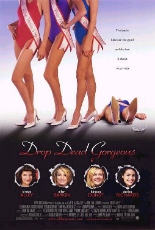
 When it first came out, the dark, beauty-pageant mockumentary
When it first came out, the dark, beauty-pageant mockumentary 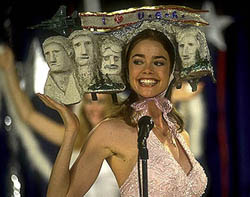 This uncanny coincidence causes the film’s many jabs at conservative “family values” to take on a newfound and occasionally disturbing piquancy. What may have once seemed overly broad now seems unfortunately believable in an age where conservative leaders such as Palin seriously decry the practice of advocating vegetables over junk food to school kids as a form of socialist liberal propaganda.
This uncanny coincidence causes the film’s many jabs at conservative “family values” to take on a newfound and occasionally disturbing piquancy. What may have once seemed overly broad now seems unfortunately believable in an age where conservative leaders such as Palin seriously decry the practice of advocating vegetables over junk food to school kids as a form of socialist liberal propaganda.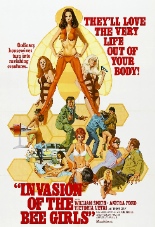
 Thanks to the talents of the filmmakers involved (especially screenwriter Nicholas Meyer, who would go on to make both
Thanks to the talents of the filmmakers involved (especially screenwriter Nicholas Meyer, who would go on to make both 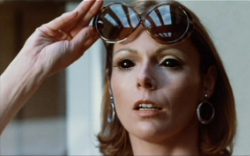 While I admit it is easy to interpret a film in which a group of sexually alluring women are compelled to engage in a mating ritual that causes their male partners to suffer fatal heart attacks as a sly commentary on the then-growing women’s liberation movement, it actually takes quite a bit of mental trickery to justify that interpretation based solely on the movie’s content. Tonally, Bee Girls never feels tongue-in-cheek, and if it were supposed to, then the attempted rape scene in its middle is more than simply gratuitous, but completely inappropriate as well.
While I admit it is easy to interpret a film in which a group of sexually alluring women are compelled to engage in a mating ritual that causes their male partners to suffer fatal heart attacks as a sly commentary on the then-growing women’s liberation movement, it actually takes quite a bit of mental trickery to justify that interpretation based solely on the movie’s content. Tonally, Bee Girls never feels tongue-in-cheek, and if it were supposed to, then the attempted rape scene in its middle is more than simply gratuitous, but completely inappropriate as well.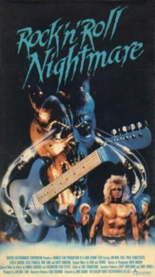

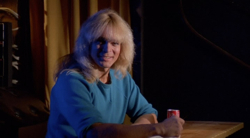 Thor (who memorably played the zombie in the
Thor (who memorably played the zombie in the 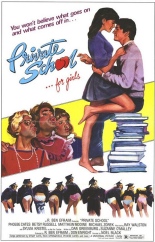
 If anything,
If anything, 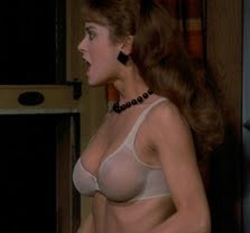 The question, then, is why such a truly terrible teen comedy that only ever works as a desperate parody of itself succeeded when Black’s other films didn’t? The answer is simple: Betsy Russell riding topless on a horse. If you’re a heterosexual male between the ages of 30 to 40, you probably “watched” this scene at least a dozen times before you moved out of your parents’ house. And if you didn’t, you likely live a life of constant turmoil and regret.
The question, then, is why such a truly terrible teen comedy that only ever works as a desperate parody of itself succeeded when Black’s other films didn’t? The answer is simple: Betsy Russell riding topless on a horse. If you’re a heterosexual male between the ages of 30 to 40, you probably “watched” this scene at least a dozen times before you moved out of your parents’ house. And if you didn’t, you likely live a life of constant turmoil and regret.